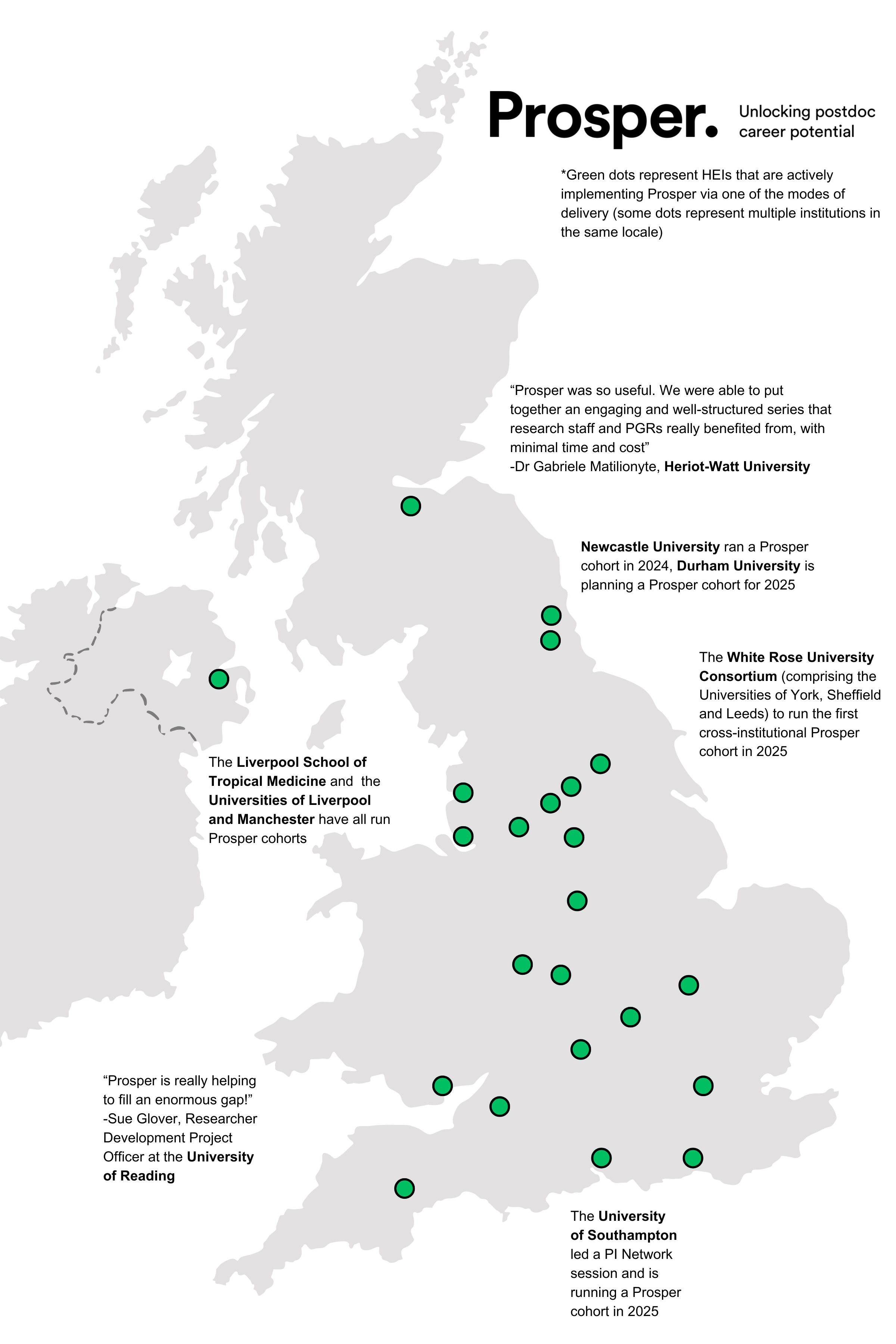This is a repost of a blog first published on the National Centre for Business and Universities (NCUB) website on 3rd March 2025: https://www.ncub.co.uk/insight/prosper-holds-first-practice-exchange-event-sharing-use-of-resources-across-the-uk
You can watch some short highlight reels of the event here: https://prosper.liverpool.ac.uk/institution-resources/community-of-practice/community-of-practice-annual-event/

On 6th February 2025, the Prosper team, part of the Academy at the University of Liverpool, held the first annual Practice Exchange event at Kimpton Clock Tower in Manchester.
The event marked a key milestone in the UKRI-funded phase of the project to accelerate roll-out of Prosper’s career development model to support career development for postdocs throughout the UK.

What is Prosper?
Funded in its pilot phase by Research England, Prosper is an approach to postdoctoral career development which seeks to unlock postdoc potential to thrive across multiple career pathways – both within and beyond academia.
Led by the University of Liverpool, partnered by University of Manchester and Lancaster University, the model was co-created with postdocs, employers, Principal Investigators (PIs), and the wider sector. Following the success of the pilots, funding was secured to accelerate the adoption of Prosper to benefit the wider UK researcher development provision. UKRI funding ends in Autumn 2026.
Now moving into the second year of activity, the roll-out is progressing well, with approaching 70 institutions across the UK using Prosper in a variety of ways aligned to their institutional needs. This ranges from actively promoting Prosper to their postdocs as a tool which they can use independently to supplement their career development activity, to running cohorts for groups of postdocs who come together for a programme of facilitated sessions and group career coaching.
Map visualising adoption of Prosper by UK HEIs to date (Green dots represent HEIs that are actively implementing Prosper via one of the modes of delivery (some dots represent multiple institutions in the same locale):

The Practice Exchange
The Practice Exchange was created to provide an opportunity to showcase the diverse ways in which Prosper is being used by higher education institutions so far, share practice and connect with colleagues. Attendees included staff responsible for researcher development from 39 higher education institutions and senior representatives from sector bodies including the N8 Research Partnership, NCUB, UKRI, the British Academy and Vitae.
The agenda was designed to provide a platform for institutions already using Prosper to share insights into the various ways it is being used to support their postdocs’ career development and the impact it is having to date. These included University of Manchester, Durham University, Heriot-Watt University, University of Southampton, University of Huddersfield and Liverpool School of Tropical Medicine, to name a few.
Key themes
Themes explored during the event include the importance of collaboration and communication between academia and industry to facilitate career porosity, which was discussed in a fireside chat-style session covering the power of external partnerships.
Another discussion point was the importance of sector-wide collaboration, as well as the value of Prosper as a free resource in times of growing challenge for the sector. Andrew Moss, Research Culture Manager at Durham University, described Prosper as a way for researcher developers to ‘collaborate with other colleagues, but also really empower our postdocs and change the dynamic about the value that they have.’
The significance of guidance for managers of researchers around how they can support postdoctoral career development was another consistent topic of discussion, with Prosper’s resources for managers (Managers of Researchers – Prosper) and the PI Network Series (The PI Network – Prosper) recognised for their value in this regard.
In summary, the Practice Exchange demonstrated the progress Prosper is making towards creating a thriving community of practice, with Alex Lewis, Director of Research at the British Academy noting the ‘warm and engaging’ atmosphere and how encouraging it was to see such positivity around career development.
Next steps
Next year’s event will build on this momentum and reflect on progress made with Prosper’s framework for sustaining impact, which is currently in development. Plans are for this to centre on a model of reciprocation (The Reciprocation Framework – Prosper) – a concept which was introduced to attendees at this year’s event by Prosper’s Senior Researcher Developer, Fiona McBride.
The idea behind the Reciprocation Framework is to formalise and encourage mutual exchange between institutions and Prosper. An early example can be seen in how Prosper provided support for the University of Southampton’s Prosper cohort, and in return the University of Southampton developed some Prosper resources for the Portal and hosted a PI Network session, open to managers of researchers across the sector.
For more details on how institutions might use Prosper, this page provides inspiration: Choose your mode of delivery – Prosper. For examples in practice, there are institutional case studies on Prosper’s blog space from Heriot-Watt University, (Institutional case study: Heriot-Watt – Prosper), University of Manchester (Institutional case study: University of Manchester – Prosper) and University of Liverpool (Institutional case study: the University of Liverpool – Prosper).
To stay informed of Prosper’s progress, you can register for the Mailing list – Prosper and register for upcoming events Events – Prosper.
To use Prosper’s resources to support your own career development, or that of your team, we recommend registering an account here on our Portal: Login / Register – Prosper.


 Refine
Refine

